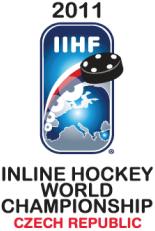PARDUBICE – In many countries inline hockey is played by ice hockey players. In the U.S. however, inline hockey is a professional sport in its own right, especially in California.
All players of the American team at the 2011 IIHF InLine Hockey World Championship come from the NARCh where the organization’s professional league consists of four teams from California and one located in Pennsylvania.
Six of the national team players are listed with the LA Pama Cyclones from Los Angeles.
Of the 14 players, 12 played in California and nine of them (plus the head coach) were born in the Golden State.
Two of Californians were up for a special adventure as they signed a professional contract with CPLV Valladolid in Spain last autumn.
It’s an experience Jose “Junior” Cadiz and Itan Chavira didn’t regret and it also brought new experiences with it, both on the court and outside of the rinks.
“It was good. We won all the major tournaments. We won the championship, the European Cup, the King’s Cup in Spain,” said Cadiz, who’s of Spanish mother tongue.
“Overall it was a good experience and lot of fun. We were two Americans on the team, me and Itan, and another American kid played in Mallorca.”
Cadiz enjoyed the experience, although he doesn’t mind playing in the U.S. and helping inline hockey grow.
“In certain areas in California it’s pretty popular, in others areas not so much,” the Los Angeles native said. “It has declined a lot in the last couple of years, but we’re trying to get it going, to play tournaments and getting younger kids going in.”
Chavira had it less easy with the language in Spain, but he tells about his experience in Europe with a smile.
“I had a great experience with the team, the league and the European Cup. It could be one of the best leagues in the world if you could have more than two imports,” Chavira said.
“It’s really professional there, like in ice hockey. They pay you, they pay for the housing, for the car.”
Chavira had a rough start at the beginning of the World Championship in Pardubice. He was disciplined for the first two games and followed the games from the bench.
Since game three in the preliminary round Team USA can play with a full roster, and Chavira is more than happy to be part of it and create a new chemistry. And to contribute to the offence.
Chavira had eight goals and one assist in three games. And he doesn’t only play for the team, but also for his brother Juaquin, who was on last year’s gold-medal winning team, but was diagnosed with stomach cancer this month and had an initial surgery.
“I wished he would be here. We used to be on the same line,” Itan Chavira said, showing his glove and stick he wrote ‘Walk strong #87’.
After steamrolling over most of the opponents, the Americans will face their probably toughest challenge in the gold medal game with home team Czech Republic.
The Czechs, too, had several high-scoring wins in Pardubice and are eager to avenge for the 4-3 loss in last year’s final against the U.S.
While Team USA is a squad consisting of professional inline hockey players, the Czech roster is highlighted by ice hockey internationals like Karel Rachunek, who recently won the bronze medal with the national team at the 2011 IIHF World Championship in Bratislava, and who are getting ready for the ice hockey camps in August.
“This event is good to prepare for the next season and to get in shape,” Rachunek said. And he also doesn’t feel burnt out after the long hockey season. “I’m not really tired, it’s kind of practice for me after a couple of weeks off. It’s a bit different. It’s a lot of skating and no body contact.”
The combination of inline hockey specialists and top ice hockey veterans like him, or Tenkrat, or Mojzis to name a few, made the Czechs one of the two strongest teams here.
Some Czech players got mentally ready last night by watching reliving how national heroes like Dominik Hasek and Jaromir Jagr won the Olympic gold in Nagano 1998 – the first Olympic ice hockey tournament with NHL participation.
“We know it’s going to be difficult and that we’re not going to have an easy game,” Cadiz said. “We have to play 110 per cent every game because everybody wants to beat us because we won the gold last year.”
The Americans, too, watched some TV to get ready.
“We watched their games on TV on the day off and studied how they play,” Chavira said before the big game.
“That’s the game we wanted. It will be a packed stadium and a hard game. We have to be ready,” he said. “We need to create lots of chances, stay close to the man, give them no space. That will be the toughest game. Championship games are always tough.”
Before the gold medal game at 17:55 local time (live on CT4, 11:55am ET), Canada and Sweden will play it out for the bronze at 15:30. Great Britain and Hungary will battle for the Division I gold and promotion to next year’s Top Division tournament at 12:30.
MARTIN MERK |







